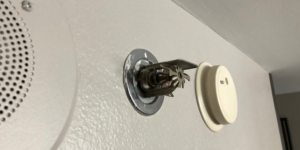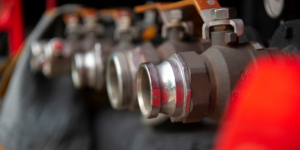Does your fire sprinkler system need cleaning or replacement? These vital safety devices are easy to disregard, yet neglecting them can be disastrous. As a homeowner or company owner, you must maintain your fire sprinklers. We’ll examine why fire sprinklers require frequent cleaning and repairs, how often to schedule them, what could happen if you don’t, and most importantly, how to identify if they need it.
Why You Need to Clean or Replace Your Fire Sprinklers
Your safety infrastructure relies on your fire sprinkler system. It detects and extinguishes fires to avoid spread and damage. Dust, debris, and corrosion can build up in sprinkler heads and pipes, reducing their efficacy.
Fire sprinklers need regular cleaning or replacement to work properly. Cleaning removes buildup that may restrict water flow or sprinkler head activation in a fire emergency. Equipment must be replaced if it is damaged beyond repair or no longer fulfills safety standards.
Cleaning and maintaining fire sprinklers protects lives and property. Regular maintenance keeps your system reliable for emergencies.
Regular cleaning and replacement can also extend fire sprinkler life. This prevents unexpected failures in critical moments when every second counts.
Remember that delaying maintenance puts lives in danger and exposes you to costly repairs or replacements. So maintain your fire sprinklers—they’re there to protect you!

How Often Should You Clean or Replace Your Fire Sprinklers?
Fire sprinklers safeguard your property and occupants. Each system needs frequent maintenance to work properly. Fire sprinkler cleaning or replacement is necessary for this upkeep.
How often should fire sprinklers be cleaned or replaced? The answer to this question depends on various things, including the sort of sprinkler system you have and its operating climate.
Experts recommend annual fire sprinkler system inspections by a certified specialist to determine if cleaning or replacement is needed. In addition, more frequent visual examinations should be checked for damage or obstruction.
Note that some situations demand more frequent cleaning or replacement. If your property is in a region with excessive dust, debris, or corrosive air, you may need to clean or repair your fire sprinklers more often.
Regular maintenance keeps your fire sprinkler system reliable, extends its lifespan, and prevents malfunctions when required the most.
Remember: preventive fire sprinkler maintenance saves lives and protects assets. Consult fire protection system experts to identify the right cleaning and replacement schedule.
What Happens if You Don’t Clean or Replace Your Fire Sprinklers?
Not cleaning or replacing fire sprinklers can be dangerous. Dirt, debris, and corrosion can block these vital safety devices. This accumulation can block water flow and impair firefighting efficacy.
Without proper cleaning or replacement, fire sprinklers may not activate when needed. Fire emergencies are time-sensitive, and delays in sprinkler head activation can spread flames quickly. Without working sprinklers, property damage, injury, and death have dramatically increased.
Dirty or obsolete fire sprinklers may not disperse water uniformly throughout a fire-ravaged area. Uneven distribution may leave some areas without water and others with too much. As a result, some elements of the building may catch fire while others remain unharmed.
How to Tell if Your Fire Sprinklers Need Cleaning or Replacement
Fire protection systems depend on fire sprinklers, which need regular maintenance like any other equipment. Fire sprinklers must be cleaned or replaced to work properly and prevent disasters.
Regular visual inspections can help you decide if your fire sprinklers require cleaning or replacement. Check sprinkler heads for corrosion, rust, or damage. These concerns may indicate sprinkler issues.
Failure to activate during routine tests may indicate that your fire sprinklers need cleaning or replacement. Periodic tests can reveal system issues and provide insight.
Also, monitor water pressure and flow when testing the system. Any significant changes from earlier tests may suggest a clogged nozzle or pipelines.
Look for false alarms caused by dust on your fire sprinkler sensors. To avoid false activations and ensure emergency functionality, clean these sensors regularly.
Proper maintenance and care are essential to keep your fire protection system running smoothly. Stay attentive and address potential hazards quickly to protect yourself and others.

Conclusion
Fire sprinklers must be clean and working properly to protect your building and occupants. Clean or replace them regularly to ensure they work when needed.
There are various signals that your fire sprinklers require cleaning or repair. These include rust, filth, water discoloration, leaks, and outdated technology. Take urgent action if you see any of these indications.
You may prevent emergency malfunctions by regularly inspecting and cleaning/replacing your fire sprinkler system. This saves lives and property from fire damage.
Remember that ignoring maintenance might have major implications. Unclear or replaced fire sprinklers may not activate during a fire due to obstruction. This endangers everyone and hinders firefighters.
Keep in touch with fire prevention systems companies to ensure industry-standard maintenance. They can evaluate your fire sprinklers and suggest solutions based on their experience.
Don’t delay! Check your fire sprinkler system for symptoms of cleaning or replacement now. Always remember: prevention is better than disaster response!
Maintaining fire sprinklers regularly ensures optimal performance in emergencies. Stay attentive, and clean, and update them—they save lives and property from disastrous fires!
